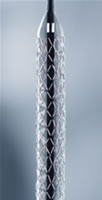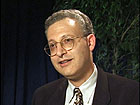|
These latest randomized data are the first to show statistically significant differences on hard clinical endpoints that clearly favor one drug-eluting stent over another at three years. Specifically, they show comparable efficacy between the Endeavor and Taxus stents in long-term follow-up, with significant safety advantages for Endeavor patients with regard to a reduction in large myocardial infarctions that are directly attributable to the significantly higher rate of very late stent thrombosis observed with the Taxus stent.” Concerns about the consequences of the higher observed rate of very late (>1 year) stent clotting in drug eluting versus bare metal stents have loomed since 2006 but have been allayed by large, population-based registry data that have not shown an increase in death or myocardial infarction . Endeavor IV represents the first long-term large, head-to-head drug eluting vs. drug eluting stent comparison to demonstrate a statistically significant increase in very late stent clotting and a corresponding significant increase in cardiac death and myocardial infarction. The Endeavor IV data definitively show that at three years of follow-up, patients treated with an Endeavor stent have a statistically and clinically significant 48 percent (p=0.004) lower risk of heart attack or cardiac death than patients treated with a Taxus stent and a 91 percent (p=0.004) reduction in the risk of very late stent thrombosis.
ENDEAVOR IV enrolled 1,548 patients, equally randomized to receive an Endeavor or Taxus drug-eluting stent. The primary endpoint in the study was non-inferiority on the measure of target vessel failure (TVF) – a composite of cardiac death, myocardial infarction and target vessel revascularization – at nine months. “Medtronic understands that clinical outcomes are what matter to patients, and we are committed to ongoing evidence-based research to develop products that improve people’s lives,” said interventional cardiologist Dr. Richard Kuntz, senior vice president of strategy, clinical and regulatory affairs at Medtronic. “These new data from ENDEAVOR IV clearly and compellingly demonstrate that the Endeavor stent should play a much larger role in the care of patients with coronary artery disease.” Medtronic CardioVascular is committed to advancing the treatment of coronary, peripheral, aortic and structural heart disease through collaboration with leading clinicians, researchers and scientists worldwide. About Medtronic Any forward-looking statements are subject to risks and uncertainties such as those described in Medtronic’s Annual Report on Form 10-K for the year ended April 24, 2009. Actual results may differ materially from anticipated results. Source: Medtronic, Inc. |



